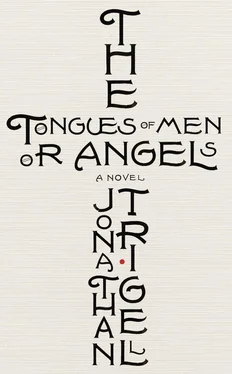And Yeshua said that Cephas was forgiven.

And among the followers of The Way, there were others who did not stop believing in Yeshua; many of those who had loved him at the first did not forsake him.
James and Cleopas were walking to a village called Emmaus, about sixty stadia from Jerusalem, when they met a stranger on the road and travelled with him awhile. The man was pious, wise and kind. And afterwards they came to realize that the stranger had been Yeshua. He had not looked like Yeshua: his face was quite different and he was older and his accent was of the south, but still, the two of them were close to certain that it had been him.
More and more of the disciples also came to believe that Yeshua lived on and would return to rule, though some had doubts. There were visions, through moisture-cloaked eyes, and there were those who searched the scriptures to see what these events meant. To see if somehow this might have been how it was all supposed to run. And there were those who pondered back on things that Yeshua had said and wondered if he hadn’t always known that these happenings would come to pass. Perhaps they had not only failed him at Gethsemane, but had failed to understand him all along.

It has been a strange and tangled path, which has led from those baleful days to here. In the disciples’ grief it was as though the very sky was darkened at the moment of Yeshua’s death. It was as if the veil of the Temple was torn. But it was not torn: the veil remains. The Temple remains. Life goes on. Not as it was, but nonetheless.
Twenty-two years have passed in Jerusalem, and The Way continues to attract believers, who celebrate the Jewish festivals and the sacrifices along with Cephas, Jochanan and James the Just.
Often the Three Pillars still spend Sabbaths together in the house of John-Mark’s mother, just as they did in those first years following their return to Jerusalem; after they were jointly persuaded that this thing had not ended.
John-Mark’s mother has long since passed away, so the building would now be more properly called the house of John-Mark, but he is seldom there and old ways of speaking linger like winter in middle-aged men.
James the Just, who always was lean as a wolf, now is also grey like one. But through his piety, his popularity among the people continues to grow.

When John-Mark comes back from his latest journey, he does so wearing the most threadbare cloak the Three Pillars have ever seen; rather than cloth, it is more like a series of connected holes.
‘You want to sell that cloak,’ Cephas says, with a smile, ‘before someone steals it.’
‘A memento of Corinth,’ John-Mark says. He is the youngest of them by some distance, but even so his black eyes have aged on this last trip alone and his shock of hair is beginning to winnow thin.
‘Corinth is a hideous place,’ John-Mark says. ‘Fish heads and faeces all over the streets, you’re happy when you step on a clamshell or a cornhusk. Even the icons stink of piss. And they practise sacred prostitution in a fashion worse even than the Canaanites: women giving themselves to strangers on the steps of the temple of Aphrodite, believing that they serve their goddess through that and their husbands’ revelling in it — I dare to say aroused by it. And this is the place that enemy Paul has made his latest base.’
‘I’m telling you, Paul does it all for money,’ Jochanan says, ‘so that he might trick wealth from those rich and impressionable women whom John-Mark tells us are led astray.’
But Cephas says that he doesn’t think this can be true. Paul must believe what he preaches, or how could he have suffered so much for those beliefs? He is not deceitful, just deluded.
‘Then wait until you hear this,’ says John-Mark. ‘Paul has made the final move into madness: he replaces the name of God in the words of the Prophet Isaiah and says that every knee should bow and every tongue confess that Jesus is God . He has at last made his Jesus fully equal to the Lord of Hosts and to be worshipped. And he now calls the Torah so much dung . He says that all who rely on the Torah are under a curse . He says we Jews have a veil over our eyes .’
‘This is the consequence of leniency,’ Jochanan says, not quite openly reproving James, but very nearly doing so. ‘We should never have countenanced the idea of Gentiles joining without full conversion.’

Even now Cephas wavers. The community at Antioch became once again a fine and loving place, after those errors instituted by Paul were corrected. Must the Gentiles really convert fully and be circumcised if they want to follow The Way?
It’s true that Yeshua said he was sent ‘only to the lost sheep of Israel’. But even still, it is not quite so simple as sheep and goats: there was one time that Yeshua almost approached non-Jews — you can’t really call Samaritans Gentiles, but they aren’t quite Jews either. Yeshua and the gathering had gazed down at a Samaritan village and the Samaritans didn’t look so different from Israelites, when you actually looked at them. They lived in the same houses: flat roofs of mud-packed reeds, walls built of bricks of sun-baked clay, with windows narrow and few, to keep out the glare and the dust. They wore the same clothes: half-sleeved ketonet; simlah with dancing fringes and tassels; leather girdles, to belt their skirts and hold their knives. And didn’t they all worship the one-God?
But the Samaritans say that the sacrifices should be made at their temple on Mount Gerizim, when right-thinking people know that they must be made in the true Temple at Jerusalem. And because of this the Samaritans wouldn’t accept Yeshua as the Messiah — though they, too, waited and prayed for one. Just because Yeshua’s face was set towards Jerusalem and not to Gerizim. And the messengers Yeshua sent ahead, who entered the village of the Samaritans to make preparations, came back and said they had been told that Yeshua was not welcome. The Samaritans had rejected the King, just because his face was set towards Jerusalem.
Perhaps that was a message then, Cephas reflects. Maybe this was the signal that all must convert and look towards Jerusalem.
But back then it was taken as insolence, not prophecy; when Jacob and Jochanan heard how their master had been scorned, they had wanted to burn the bloody village down. They had wanted to torch the fields and spoil the wells. They had wanted to bring fire on the Samaritans as if it were lightning from the heavens.
Only Yeshua had stopped them, with a laugh like rolling waves and a smile wide as a rainbow. Yeshua had said their zeal was good, but their target was wrong. Yeshua clasped the brothers to him and named them his Sons of Thunder.

Jochanan’s thunder has still not fled him in middle age. ‘We need to counter these colonies of blasphemy that Paul is founding,’ he says. ‘We must pursue his path like John-Mark has, but as an army, no longer like scouts. In every place where Paul has founded a community, we need to send loyal messengers of The Way, relentless men who won’t stop until the members of those churches embrace the Law of Moses and that polluter of waters is exposed.’
‘Agreed,’ James says.
They both look to Cephas: there must be consensus.
Cephas’s brow furrows, deep as the wrinkles of the ram’s horn that even now blows from the corner of the Temple. This decision cannot be left for ever.
Читать дальше













